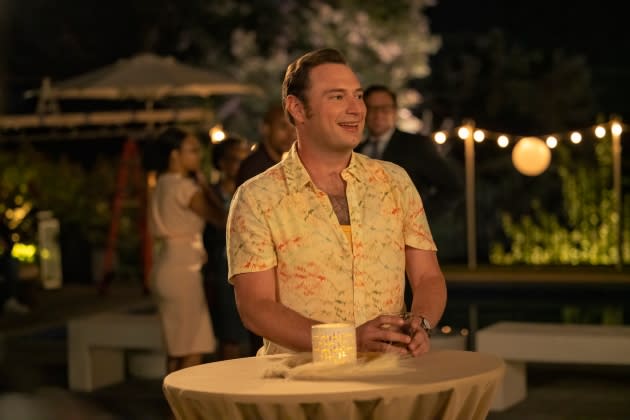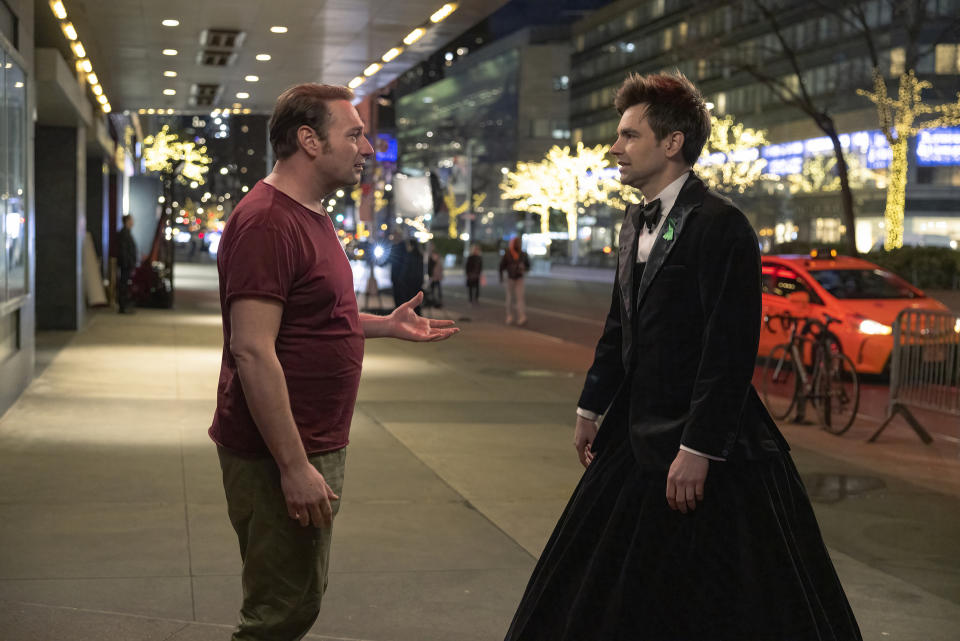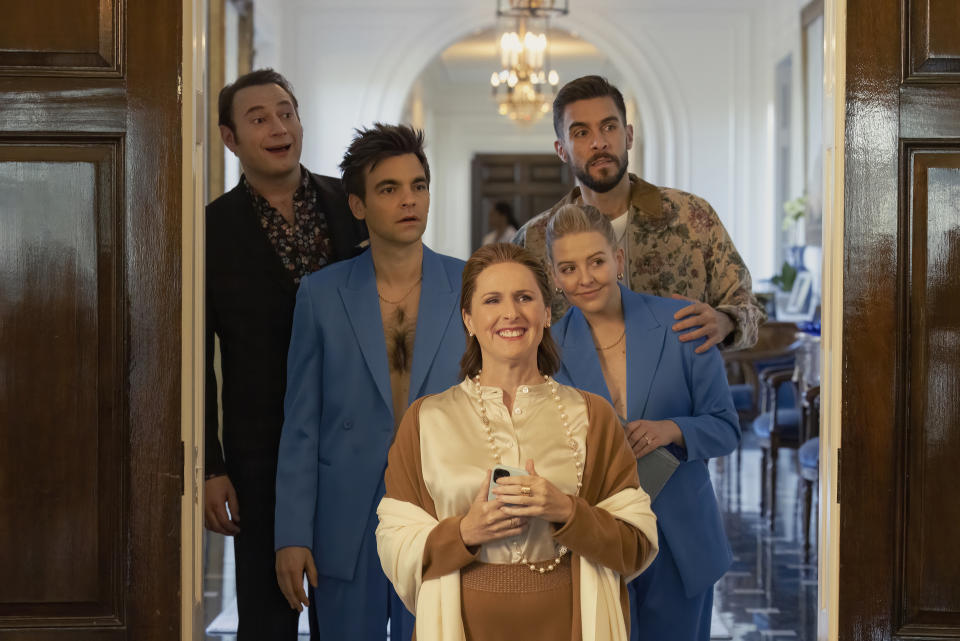Brandon Scott Jones on Curtis and Cary’s Conflict in ‘The Other Two’: “He’s Reaching a Breaking Point”
- Oops!Something went wrong.Please try again later.

[The following story includes spoilers for The Other Two season three.]
While Curtis Paltrow is, technically, the gay best friend on The Other Two, actor Brandon Scott Jones says he’s far from a “sassy, frivolous side character.” It’s a good thing, too, because after a slow-burning conflict exploded in the latest episode there may not be much of a friendship left.
More from The Hollywood Reporter
The Max series from Saturday Night Live alums Chris Kelly and Sarah Schneider centers on Cary (Drew Tarver) and Brooke Dubek (Heléne Yorke), siblings who are perpetually fighting to get out of the shadow of their pop star brother ChaseDreams (Case Walker) and, as of this season, also that of their media mogul mother Pat Dubek (Molly Shannon).
Jones plays Curtis, Cary’s best friend and fellow actor. At the beginning of the series, they’re waiting tables together, and their relationship evolves as their careers ebb and flow — though Curtis is more loyal and supportive while Cary is a bit, well, narcissistic and selfish.
In episode seven, “Cary Gets His Ass Handed to Him,” Curtis finally reaches a breaking point after tension between the friends has been building all season. When Curtis’ Paramount+ series Girlies looked like a hit, Cary declined to come to a viewing party, but, as soon as it became clear it was actually a flop, he showed up, and Curtis saw right through it. “Go fuck yourself, Cary,” he says calmly before asking him to leave. Cary plays dumb and lies about having seen the show’s Rotten Tomatoes score, and Curtis confronts him explaining that he’s only supportive when he’s feeling superior, and they’re not really friends anymore. Jones says it was a tough scene to film, especially since he and Tarver are friends in real life, but it was a long-awaited moment for his character.
“One of the joys of my life is getting to play Curtis,” Jones tells The Hollywood Reporter. “I think queer friendships have a weight to them. To see a relationship onscreen that’s non-romantic like Cary and Curtis and to see the weight it has when it dissolves, as it does in episode seven, it’s a good perspective on what found family means [and] how you should really root for others.”
Ahead of the episode’s release, Jones — who also stars in CBS comedy Ghosts and Universal’s Renfield, which is now streaming on Peacock — talked with THR about whether he thinks Curtis is truly done with Cary and why a little envy isn’t always a bad thing.
What was filming the friend breakup scene like?
It was tough. In real life, Drew Tarver is one of my best friends. I love him so much. I guess I’m not at that point as an actor where I can really dissociate from me doing something in real life versus me doing something onscreen. Obviously, I know the realities are different, but it feels the same. So, it felt really weird to be angry at him. We kept calling it “the hard scene” because we knew it was sort of like the pinnacle of what this season is about with our relationship. It was a good feeling going into it, though we were definitely stressed out. You want it to land. We really worked hard on it.
From my perspective as Curtis, I was happy to see him really lay into Cary a little bit. There was definitely a catharsis in that. Chris and Sarah and the writers were targeting this idea of you want me to do well just not better than you, and that’s somehow just as bad as wishing me worse. I was happy that he stood up for himself because I think it’s something that needed to be said. Curtis holds his found family of friends very, very dear to him. Anytime that love that he has for other people isn’t reciprocated, or when the concept of let’s love and support each other is violated, it’s a real problem. I was really happy that he was able to put things in perspective for Cary, but it was also sad because it’s the end of a really meaningful friendship.
How would you describe Curtis?
You could describe Curtis as the gay best friend in a lot of ways, but you can also describe him as the freer version of Cary. He’s the version of Cary that has fewer inhibitions. He’s willing to date more. He’s willing to mess up. He’s willing to compromise any type of optics for his own enjoyment and happiness. But I would mainly describe him as a good friend. He’s a really good friend, who’s fun and silly.
What has it been like watching this character grow from the beginning of the series?
I got the part of Curtis very last minute, almost the morning of because the person who was originally supposed to play the character wasn’t able to do it. They called me, and I came in to shoot the scenes in the very beginning. When you do that, you’re like, “OK, this is another guy that works at the restaurant with the main character. Maybe you’ll see him again.” As the seasons progressed, similar to Lance [Josh Segarra] with Brooke, he has been this sort of touchstone of reality for Cary. It’s been nice to see this character — that, in a lot of shows, can be relegated to just being the funny, sassy, frivolous side character — have a little bit more depth. To say like, “Hey, listen. I am your best friend, and I am going to be this wild, crazy person, but, at the end of the day, I’m still a human being that deserves your time and attention.” We saw a little touch of it last season. They’re on the ferry, and he’s telling Cary to stop complaining about his life, which basically Curtis would totally kill for. To see Curtis get some success of his own and how he deals with it differently than Cary, the work that he’s done on himself that has allowed him to love others and root for others, I think it’s a nice dichotomy. So, it’s been really nice to see these two friends do something very real, which is grow up and grow apart a little bit.

There’s a scene in episode three, the party at Ellen DeGeneres’ house, where you had made some self-deprecating comments about this role that you landed. Then Cary, clearly out of jealousy, turned it around in a really ugly way. What was that scene like for you, and what did you think about the writing there?
I love the writing. He refers to his “femme privilege.” I remember I wasn’t sure if that was a real term that people were using, but I thought it was a really interesting way to see how in a great moment he was still taking care of his friend. He was still trying to manage somebody else’s feelings, which you shouldn’t have to do. You shouldn’t have to tamp down your celebration just because someone else isn’t rooting for you.
That scene was a really great example of his emotional intelligence. Curtis saw that his friend was really not in a good place, just [because] he had some good news. I was surprised by where it went with the writing. I didn’t realize he would weaponize it so quickly. It was sort of the beginning of the end with them. They were in the trenches together working at this restaurant, and they both had the same dreams. Cary, through wild circumstances, got to move up in his world, and Curtis kind of stayed the same, but then finally got this chance. He wanted to share in all the excitement, and Cary couldn’t do it. It was a really sobering moment for him, but he’s willing to give Cary another chance.
Watching it as a viewer, it felt like Cary really crossed a line there.
He did, he did. Curtis [was] really trying to give this guy a chance because he does root for and love Cary very much. Cary just can’t see that. He can’t reciprocate it. Curtis is finally starting to be like, I’m 35. I want good friends in my life. I don’t have time for this bullshit anymore that I stuck through in my 20s and early 30s. I think he’s reaching a breaking point.
When I got the scripts, and when Chris and Sarah called and told me where the season was going, I thought it was really fascinating to see Drew’s character go through this dark period, to kind of go inward with him shutting out the people that really care about him.
What have been some of your favorite scenes this season?
I did enjoy the Ellen party stuff. That was fun because that location was really beautiful, and it was a chance to have the spotlight on Curtis and see how he was moving through the space and getting to affect Cary in that way. From an acting standpoint, I really love that scene. There’s also a scene in the very beginning of this season where Lance, Brooke, Cary and Curtis all go to Pat’s house. I got a chance to work with Ken [Marino] and Wanda [Sykes] and Molly and Heléne and Case. This was the first time we got to really spend time onscreen together. It’s a really special group of people. I’m kind of in awe when I go to work. Ken Marino, Molly Shannon, Wanda Sykes. I’m like, what are we doing here? I should not be in this room. Then, Drew’s one of my best friends, and I’m the biggest fan of him. I think he’s so good and funny and smart, and Heléne is amazing. I’ve been a fan of hers, as a Broadway fan, for so long. So, to be in that room with those people was really cool.

Over the years that this show has been shooting, how has Brandon’s acting career changed as Curtis’ acting career has changed?
Ooh, that’s a great question. When I first started on season one, I was mainly in a guest star, co-star world of auditioning for people that just like pop into shows. That’s who Curtis sort of was. I think Curtis, at that time, would’ve dreamed for that type of role. I really identified with him in the very beginning as somebody who has these dreams but is trying to make the best out of the life he has right now. It’s interesting because I’m very lucky that a lot of my friends are extraordinarily talented and very cool. I look up to them, and I got a chance to watch a lot of them have some success way before I got a chance to have any opportunities like that. Those were the moments that I really identified with Curtis, just sort of trying to keep on the path for yourself while also being excited for your friends and, in a good way, envious of them. Envy and jealousy doesn’t have to always be a negative thing. It’s okay to say that you want what somebody else wants. If you want them to have it, too, that’s where it stays virtuous.
Curtis seeing Cary get all of these opportunities — that moment last season when he’s just like, “I would kill to have one-tenth of what you have” — I remember that feeling so well, and I was able to draw on it. I wrote on the second season, and I remember that moment, building to that scene and thinking they’re hitting on something that felt true and real. Then, this season there’s a shock and surprise that he got a series regular. I became a series regular on this show this year, and that was a shock and surprise to me.
Curtis is a little bit more optimistic than I think Brandon is. Curtis is like, “Oh my God. Alright, let’s do it!” Whereas I think I’m a little bit more head down like, “Oh my God. What’s gonna happen?” I think I’m a little bit more stressed. Curtis is like the drunk version of me — less inhibitions, like “Let’s go! Love, love, love.” I’m a little bit more tense than he is, but it’s been fun to have that shock of getting an actual steady job. I was able to bring that to the season this year.
What else have you been up to?
This past year was a very busy year. I was very grateful for it, and then I was equally grateful for February of this year when I slept the whole month. I was so tired, but it was great. I sort of bounced back and forth between Ghosts and The Other Two. Right before all of that, I had just finished shooting Renfield. 2022 was a busy 12 months, but I’m very, very grateful for it. Now it’s all kind of coming out in one clump.
What is it like for you to shift back and forth between characters?
If Curtis is like the drunk version of me, Isaac on Ghosts is like the hungover version of me, a little bit crankier, a little bit more frustrated and tired. I tried to tap into both of those sides. The hardest is like the vibe check. I have an ensemble up in Montreal that I’m really grateful to be a part of, and I’m with consistently for weeks at a time, and then we’ll have an off week, and I go down and join this cast. The big thing is just wanting to fit in and make sure that you’re a good team player. You only have a certain amount of time, so you want to bring your A-game. The easiest way to describe it is sort of a whiplash but in a good way, in a challenging, fun way.
How would you describe your character in Renfield, and how did you get involved in that?
My team sent me the script for Renfield when we were finishing season one of Ghosts. I had been weirdly wanting to play somebody like a therapist or social worker. Mark was a character that was a grounding force in a very high-concept movie — a guy that’s trying to teach people how good life can be and also has no idea how bad it actually is, which I thought was really funny. I got the script, and I read it, and I loved it. I got the sides, and I put myself on tape. Rebecca [Wisocky] from Ghosts played Dracula as I read opposite Dracula. A couple weeks later I met with [director] Chris McKay and [producer] Samantha Nisenboim, and I read for them. I was pumped as hell to join that movie because I’m a huge Nicolas Cage fan, but I’m also a huge Nicholas Hoult fan. I think he’s so great, and he is The Great.
I see what you did there.
You see what I did there. (Laughs.) It was just a really cool, fun experience. I do a lot of this like high-concept horror-adjacent stuff. I was dead in The Good Place. I’m dead on Ghosts. I’m in this vampire movie where I die and then come back to life. It was fun to play the grounding character in that.
How is it different for you to act in a series that you’re writing on?
Writing on The Other Two in season two was really cool. I feel like I did a pretty good job of divorcing myself as an actor from the stories that needed to be told. Though, there were a couple times where I was like trying to pitch myself. Like, “You know, who needs to be in this scene? Curtis.” I was mainly there to learn and to help write, and it was really fun to see how the sausage was made, so to speak. I felt as though when we went to go shoot it I had a great grasp on the entire season. You don’t always get the opportunity to have that as an actor.
Is that something you want to do more of?
Yeah, I would love to. It’s time-consuming in a great way, but it’s something I would love to continue to explore. I like the collaborative nature of this job. It’s fun to work with other writers. It’s fun to work with a crew shooting the show. It’s fun to really piece it all together. So, I think any chance that I get to be in collaborative situations like that I’m going to always jump at.
Is there anything you can tease for Curtis for the rest of the season without being too spoiler-y?
You’ll definitely see him again. When you see Curtis without Cary, I think you’ll get a better perspective. Without spoiling it, I’ll just say I think he’s going to try to leave some doors open for Cary. Whether Cary goes through them or not is really the question that needs to be answered.
Interview edited for length and clarity.
Best of The Hollywood Reporter

